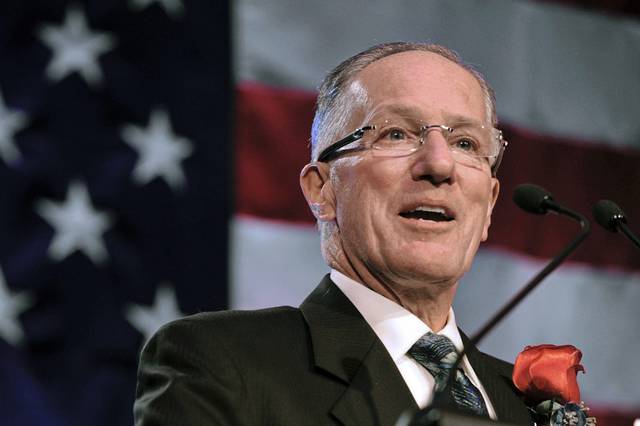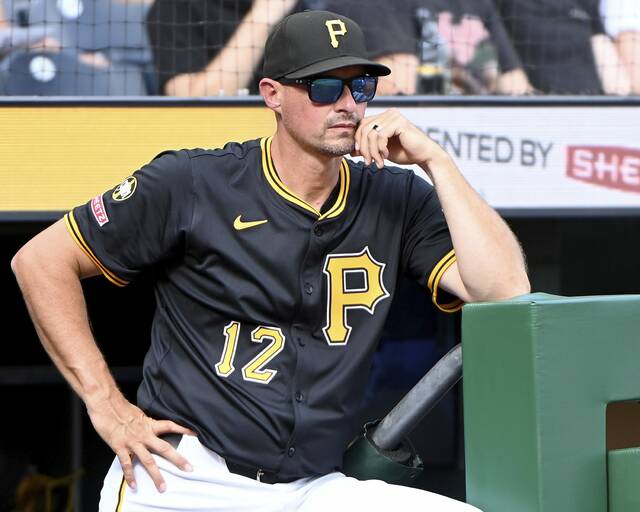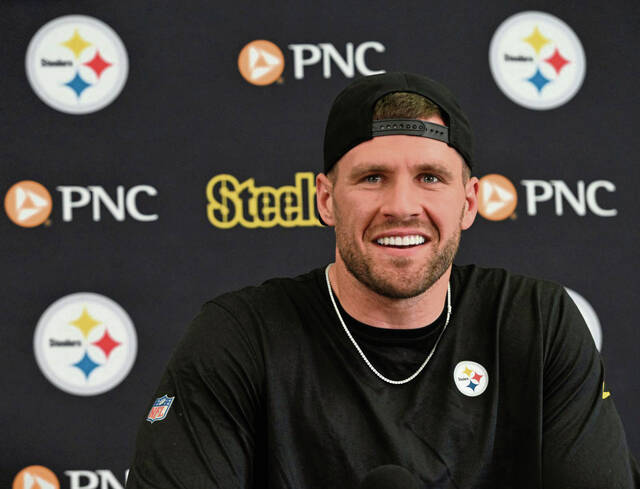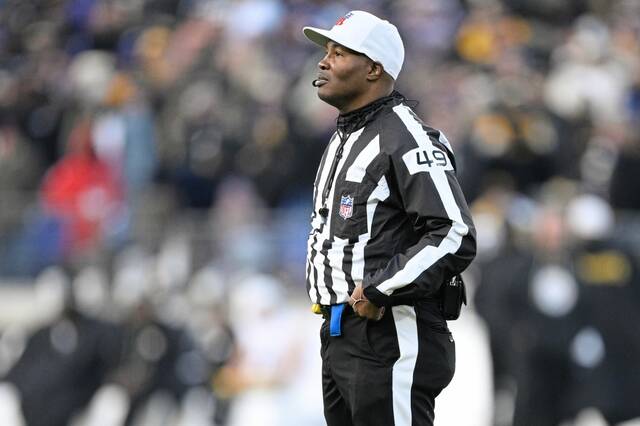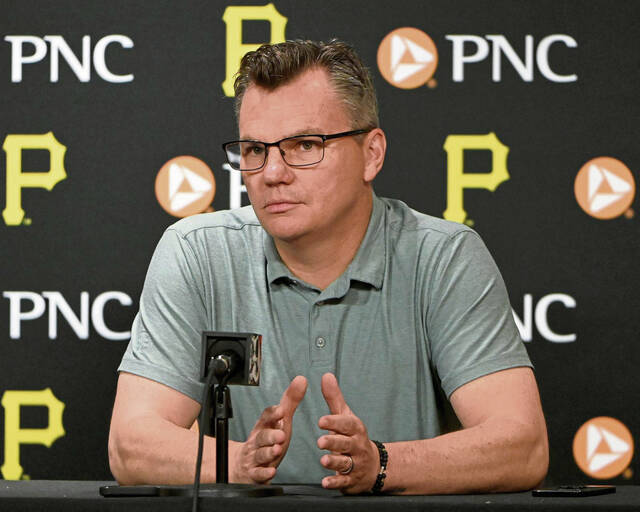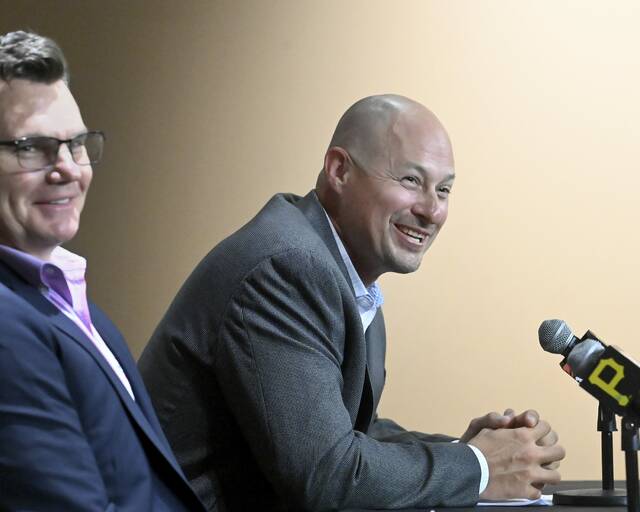The first time Mike Emrick covered an NHL game, he did so as a freelancer.
The operative portion of that term being “free.”
Working full-time as a speech professor at Geneva College in the late 1960s and early ’70s, Emrick offered to cover Penguins games for the Beaver County Times. Being that the Penguins were still in their infancy and positioned below the Pirates, Steelers or Pitt on the totem pole of relevancy in Pittsburgh sports, Emrick’s compensation for the gig wasn’t limited.
It was nothing.
He covered the games for no financial benefit. His only reward was getting a press credential.
And a start.
After being being rejected for a handful of play-by-play jobs with minor league teams, the Indiana-born Emrick emigrated to Western Pennsylvania.
“I needed a job and they were offering a job at Geneva College in Beaver Falls for a person to teach public speaking and supervise the campus radio station, which was 15 watts,” Emrick said. “I taught classes on Tuesday and Thursday, and I might be able to moonlight a job covering the Penguins because I still had this ambition to be a play-by-play broadcaster in hockey. So I went to the editor of the Beaver County Times, which was an evening newspaper. I said, ‘I’ll cover the Penguins for free if you get me a (media credential).’ And he said, ‘It sounds like a good deal to me.’”
That modest and frugal genesis provided Emrick a foundation for a career that eventually allowed him to become arguably the best of his vocation as a hockey broadcaster.
On Monday, Emrick, 74, announced his retirement after more than 50 years in the business.
“I was told by people who had retired that you would know when,” Emrick said in a conference call with media on Monday. “In the middle of the playoffs this year, it was probably between rounds two and three that it finally registered with me that this was the time. I had realized that all the guys that I talked to were right. That you will know when it it is time, and this seems like the right the time. It was reinforced by the fact that my health was still good and (his wife) Joyce’s health was still good. This all just seemed like the right time.”
Emrick has worked as the lead play-by-play voice for NBC ever since the network acquired the NHL’s broadcasting rights in 2005.
His final season with NBC was hardly ideal.
Because of the coronavirus pandemic, the NHL halted play in mid-March and did not resume until August for a postseason tournament. Emrick, a cancer survivor, was forced to call games from a studio that was built into his Michigan home.
Despite those circumstances, Emrick’s call from the final seconds of Game 6 in the Stanley Cup Final — staged in Edmonton — between the Tampa Bay Lightning and Dallas Stars was, as usual, a frantic, nuanced and eloquent oration.
Emrick received the Foster Hewitt Memorial Award, which recognizes the broadcasting field, from the Hockey Hall of Fame in 2008. He was also inducted into the United States Hockey Hall of Fame in 2011.
The first contest Emrick covered professionally brought him in contact with two Hall-of-Famers: former Penguins coach Red Kelly — a legendary defensemen with the Toronto Maple Leafs and Detroit Red Wings from the late 1940s through the mid 1960s — and iconic Pittsburgh broadcaster Myron Cope.
“It was against the Los Angeles Kings,” Emrick said in a 2010 interview. “(Forward) Ross Lonsberry was playing for the Kings and had a couple goals I think. Red Kelly was the (Penguins) coach. He was terrific to work with. The Penguins had a bunch of injuries and after the game (a Penguins loss) was over, another guy got hurt in the game.
“The only two of us who went down to see Red after game were myself and Myron Cope. Myron had a unique way of taking notes that I had never seen before and I’ve never seen since. He had a roll of cash register tape that he would keep in the palm of his hand. And he would unfold it, and he would make notes on the paper as it rolled over his index finger. It was kind of neat in a way.”
“And Red started to tell about this story — Red had a farm up in Canada — he said, ‘I’m an old farmer, and I’ve always felt that whenever the worms were close to the top of the soil that bad things happened. And I wouldn’t be surprised if right now, if I stuck a spade into the ground, there’d be a lot of worms at the top because we’re sure having a hard time.’
“And by the time (Cope’s) tape had touched the floor, Myron was still making some notes on Red’s story because Myron liked things that had odd twists that he could really dress up for television. “
Nicknamed “Doc,” Emrick holds a Ph.D. in communications from Bowling Green and even helped create the NHL’s pronunciation guide which contains phonetic spellings for every NHL player, ranging from mundane entries such as Sidney Crosby (“SIHD–nee KRAWZ–bee”) to more complex surnames like Kevin Czuczman (“KEH–vihn CHUHRCH–man”).
One of Emrick’s signature features while working in a national capacity was a routine Pirates reference. Whether it be a casual reminder of Richie Hebner’s birthday or a subtle nod to A.J. Burnett’s ERA, Emrick always dropped a reference to the baseball team he had rooted for ever since he could pick up KDKA-AM’s strong signal from his boyhood home in Indiana.
Despite the franchise’s futility throughout the past three decades, Emrick remains loyal.
In recent years, Emrick has occasionally sat in with Pirates broadcasters.
“I really admire the guys that do the radio and television because I listen to them all summer,” Emrick said in 2010. “I’ll have a game on. Whether I sit and actually watch it inning by inning, sometimes I do. Other times, I have it on in the house all the time. My wife is a very tolerant person. Not only in the winter for hockey but also the summer because I have the ballgame on. We have more than one (television) set, thank goodness.”
In addition to being NBC’s lead play-by-play voice, Emrick previously held the same role when the league’s broadcast rights were held by Fox in the 1990s and ESPN in the 1980s. He also served as play-by-play broadcaster for Philadelphia Flyers and New Jersey Devils broadcasts from the mid-1980s through the early 2010s.
Emrick also handled play-by-play duties for CBS and NBC at various Olympic tournaments.
He even dabbled in football, calling a handful of games for the NFL on CBS in the early 1990s.
Over the course of half a century, Emrick realized the pursuit of perfecting his craft would be inefficacious but certainly rewarding.
“One of the things that I regret that I did early is to try to be so exact all the time,” Emrick said. “I just wanted to do the perfect game. We all want to serve the fans and we all want our call to sync up with the picture, and we all want to do the job right. Some of us, more than others, fanatical about it. I used to get so upset. … I would misidentify a player, and I would slam my hand down on my book that I kept my rosters in and it would make a loud noise. But it was just out of frustration with myself.
“As time passed, I became more comfortable with myself in the fact that I was flawed. There was no way I ever going to do a perfect game. The mistake was to try to do it that way. … So I had to just relax and realize … just be myself. And myself was not a perfect individual. I just enjoyed the fact that I was given a free seat — a good seat — and I got to work with some of the best athletes in the world. Then twice a month, I got something pretty good. And it was really good.”


